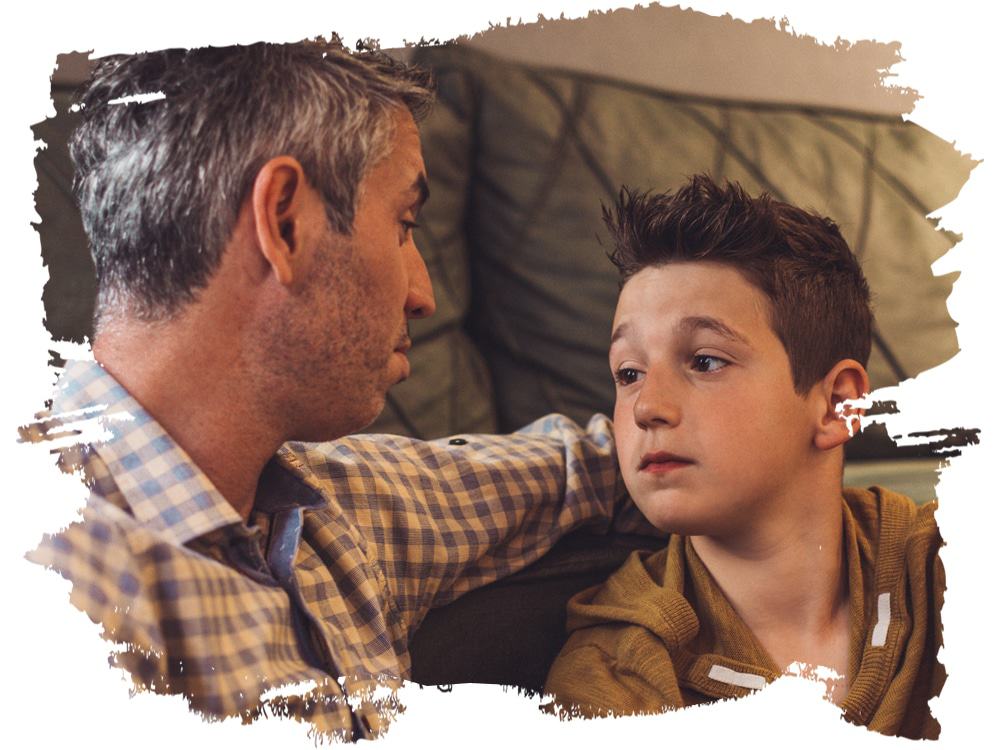
Intimate partner violence
To better understand
Many young people have their first intimate and romantic relationships during their teen years. These relationships, heavily charged with emotion, play an important role in developing a teen’s identity and sexuality. While these intimate relationships are often healthy and respectful, unfortunately many are tainted by violence.
In teen dating, violence may take various forms: insults, jealousy, controlling the other and who they can see, manipulation, blackmail and threats, punching, non-consensual sexual contact, etc. These experiences of violence may occur in a face-to-face relationship or in a virtual relationship (cyberviolence). All young people can become victims of intimate partner violence regardless their sex, gender, sexual orientation and culture. All teens are susceptible to becoming victims, perpetrators of or witnesses to violence.
Whatever form violence takes in an intimate relationship, physical, psychological, verbal, or sexual, it scars the victim and can lead to a multitude of consequences on their mental, physical and sexual health, such as a more negative self-perception, psychological distress, anxiety or substance abuse.
What can be done about this particularly concerning reality? Several possible actions can contribute to reducing the incidence of intimate partner violence. As parents, you therefore play a crucial role in preventing and countering incidences of violence in young people’s intimate relationships.
• 39 % of young people who have had an intimate relationship have experienced violent behaviours perpetrated by their partners;
• 25 % of young people who have had an intimate relationship have acted violently towards their partners;
• Psychological violence is the most common form of violence suffered and inflicted in romantic relationships involving young people.
Want to dive deeper?
Learn more statistics, important facts and tips to help families, the school and the community to take action through our information leaflets.
To better support
Communicate
- Talk to your teen about consent, respect and equality; you’ll give them the key ingredients for healthy, safe and harmonious relationships!
- Using a caring approach, talk to your teen about the various ways violence can show up in an intimate relationship, how to recognize it and the resources available to them if they become a victim, a perpetrator of or a witness to violence.
- Encourage your teen to call out violence in intimate relationships and talk about how they can help combat the violence (for example, what they can do if they witness violence in an intimate relationship).
- If you notice changes in your teen’s behaviour or attitude since the beginning of their romantic relationship (irritability, isolation, low self-esteem), make them aware of your concerns in an open, non-judgmental way and don’t hesitate to ask for help.
Supervise/Guide
- Set clear limits with your teen between what respectful behaviours and unacceptable behaviours are in romantic relationships.
- Report all forms of violence in an intimate relationship and intervene if you witness such behaviours, in particular by providing your help to the victim or the witness and by helping the perpetrator resolve their violent actions.
- Collaborate with the school and the other settings they attend to prevent and intervene in situations of violence.
Support
- Listen to your teen and their needs and offer them your support while respecting their boundaries. Pay attention to the signs of intimate partner violence.
- Work with your teen to develop and strengthen their confidence and self-esteem. For example, point out their strengths and encourage them to establish boundaries.
- Together with your teen, come up with alternatives to violence and explore how they can express their emotions and resolve conflicts while maintaining self-respect and respect for the other person. Support them in developing their skills.
- If your teen reveals experiencing intimate partner violence, welcome your teen’s confidences with empathy, caring, seriousness and without judgment. Remind them that they are not responsible for the abuse.
- Whether your teen is the victim or the perpetrator of the intimate partner violence, make sure they get the help they need (health professional, school counsellor).
Create a healthy home environment
- Create a healthy, harmonious and inclusive home atmosphere where respect for each family member is valued.
- Foster a trusting atmosphere at home so that your teen will want to confide in you and ask for your help if they are in difficulty.
- Adopt a zero-tolerance attitude toward all forms of violence.
If you are a victim of domestic violence, do not hesitate to ask for help to get out of this situation.

- Use videos or newspaper articles to facilitate discussing this issue with your teen; these tools provide concrete examples of violence in romantic relationships and allow them to ground the ideas in reality.
- Be a positive model for your teen by making sure your relationships, with your partner and the other members of your family, are healthy, harmonious and inclusive.
In brief
Many young people experience violence in their intimate relationships. As a parent, it’s essential that you take action to prevent and counter this violence. This can be a difficult topic to discuss, but it’s crucial that you talk about it with your teen. It’s also of utmost importance that you guide them in developing healthy and inclusive relationships and that you actively engage them in preventing violence. Absolutely no form of violence can be tolerated! Don’t hesitate to ask for guidance from school staff, community organizations or health professionals.
Practical resources and tools
1. If you need support
If you are concerned about a situation, do not hesitate to reach out to a support worker or a healthcare professional:
2. For more information
- Ado 101 : guide pour les parents et l’entourage (French only)
- Page web Faire vivre de la violence ou en vit – Ligne Parents (French only)
- Fiche PDF – Flash PAJ #1 – La violence subie dans les relations amoureuses chez les jeunes. (French only)
- Site de l’AQPV – Cyberviolence in teen intimate relationships
- Projet Mosaïk : promotion et prévention en matière de sexualité jeunesse (French only)
- Fiche PDF Projet Mosaïk – La violence dans les relations amoureuses à l’adolescence. (French only)
If your safety or your teen’s safety is being threatened, call 9-1-1 or contact your municipal police department.
The police department can help you in cases of violence, bullying, street gang prevention, delinquency and other offences.
I am text block. Click edit button to change this text. Lorem ipsum dolor sit amet, consectetur adipiscing elit. Ut elit tellus, luctus nec ullamcorper mattis, pulvinar dapibus leo.
I am text block. Click edit button to change this text. Lorem ipsum dolor sit amet, consectetur adipiscing elit. Ut elit tellus, luctus nec ullamcorper mattis, pulvinar dapibus leo.
I am text block. Click edit button to change this text. Lorem ipsum dolor sit amet, consectetur adipiscing elit. Ut elit tellus, luctus nec ullamcorper mattis, pulvinar dapibus leo.
Latest updates: june 2022
Post a Comment
You must be logged in to post a comment.







